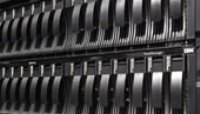Hardware Vendors Line Up Storage Offerings

Storage is the uncontrolled part of IT expenditure. That’s a temptation that few hardware vendors can resist.
Storage is now apparently the only major part of IT expenditure that is still growing out of control, which presents a complex opportunity for hardware vendors: to offer users a way to rein in those costs, to exploit them mercilessly while the storage boom goes on or, in most case, to offer something between these two extremes.
Dell came out with significant news on the storage front, and recent announcements from Oracle/Sun and IBM show that the major vendors are all figuring out the best way to profit from the demand, while promising improvements in efficiency using techniques such as de-duplication virtualisation and thin provisioning.
The reason for the excitement in storage is the fact that, despite overall tightening in IT budgets, the amount of storage that users have on site – and the amount they spend on it – just continues to grow. “Storage is the last bastion of IT that hasn’t been modernised,” said Nikki Wilton, director of data management at Unisys, in an eWEEK debate, Stamp Out Storage Waste, this week. Its share in the IT hardware spend actually grew from ten percent to 17 percent during the course of 2008 and 2009.
New hardware – and tools to get control
 Dell’s response to this is a storage refresh that came in as part of its major cloud announcement this week based around EMC’s Celerra and Data Domain ranges and including its own high-end Object Store appliance.
Dell’s response to this is a storage refresh that came in as part of its major cloud announcement this week based around EMC’s Celerra and Data Domain ranges and including its own high-end Object Store appliance.
The NS range file and block storage system is from EMC, and handles tiering and deduplication for different data types, while the Data Domain (DD) de-duplication products stemming from EMC’s acquisition of Data Domain in 2009 are intended to make backup more efficient by reducing bandwidth and storage needs.
The company is far more excited about its own monster product, the DX Object Store. It is not announced in detail yet, but Dell CTO Brian Prince enthused about in a London meeting with eWEEK Europe: “Seventy percent of business data is static and unstructured,” he said. “People need a complete solution for that.”
When it arrives, the DX product will use metadata to find and deliver information, using affordable storage, said Prince.
Sun has an SSD vision
Of the big players, Sun – now part of Oracle – has a claim to having a vision. At the recent event to welcome Sun customers to Oracle, the company seemed most excited about its storage, announcing plans to put solid state disks (SSDs) front and centre in user sites.
“You can make a fast, reliable, low power storage subsystem if you put Flash in front of the most boring disk subsystem,” Simon Culmer, formerly Sun’s UK sales director said. “But you have to have incredible software.” SSDs can provide fast reliable access, and may even obsolete some of the technology currently used to make hard drives work in an enterprise, said Culmer – stopping short of the idea expressed in eWEEK Europe’s webinar that disks will eventually be displaced by SSD.